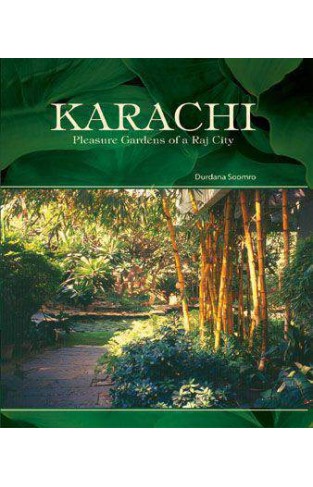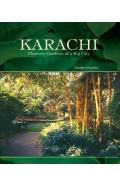KARACHI PLEASURE GARDENS OF A RAJ CITY
By: Durdana Soomro
-
Rs 2,975.00
- Rs 3,500.00
- 15%
You save Rs 525.00.
Due to constant currency fluctuation, prices are subject to change with or without notice.
Karachi has never been known as a city of gardens, Early British visitors complained of it being hot and arid – “as sandy as a Scotchman’s whiskers” Today it is often seen as a violent and troubled city. The greening of Pakistan’s largest city and former capital has, therefore, gone unnoticed. Public parks are increasing but the most beautiful gardens remain behind high walls unseen by the public. This book reveals them for the first time.
But this is not simply a book of pretty gardens. It also has a historical angle, focusing on the development of gardening in Karachi, the impact of the three great traditions – Hindu, Mughal and English – and how gardeners have coped with the adverse environmental conditions. Although British influence on landscaping continues to be strong and is most noticeable in the old parks, clubs, and colonial bungalows, new trends are emerging, which are highlighted in the book
Around thirty gardens are covered – both public and private – with separate pieces on some of the most interesting ones and there are almost 200 photographs. Wherever possible tips and advice have been included, gleaned from the successes and failures of the author and other Karachi gardeners.
| Book | |
| What's in the Box? | 1 x KARACHI PLEASURE GARDENS OF A RAJ CITY (T) |
Karachi has never been known as a city of gardens, Early British visitors complained of it being hot and arid – “as sandy as a Scotchman’s whiskers” Today it is often seen as a violent and troubled city. The greening of Pakistan’s largest city and former capital has, therefore, gone unnoticed. Public parks are increasing but the most beautiful gardens remain behind high walls unseen by the public. This book reveals them for the first time.
But this is not simply a book of pretty gardens. It also has a historical angle, focusing on the development of gardening in Karachi, the impact of the three great traditions – Hindu, Mughal and English – and how gardeners have coped with the adverse environmental conditions. Although British influence on landscaping continues to be strong and is most noticeable in the old parks, clubs, and colonial bungalows, new trends are emerging, which are highlighted in the book
Around thirty gardens are covered – both public and private – with separate pieces on some of the most interesting ones and there are almost 200 photographs. Wherever possible tips and advice have been included, gleaned from the successes and failures of the author and other Karachi gardeners.
KARACHI PLEASURE GARDENS OF A RAJ CITY
By: Durdana Soomro
Rs 2,975.00 Rs 3,500.00 Ex Tax :Rs 2,975.00
Zubin Mehta: A Musical Journey (An Authorized Biography)
By: VOID - Bakhtiar K. Dadabhoy
Rs 892.50 Rs 1,050.00 Ex Tax :Rs 892.50
The Origins of Political Order From Prehuman Times to the French RevolutioN
By: Francis Fukuyama
Rs 4,045.50 Rs 4,495.00 Ex Tax :Rs 4,045.50
Zubin Mehta: A Musical Journey (An Authorized Biography)
By: VOID - Bakhtiar K. Dadabhoy
Rs 892.50 Rs 1,050.00 Ex Tax :Rs 892.50
KARACHI PLEASURE GARDENS OF A RAJ CITY
By: Durdana Soomro
Rs 2,975.00 Rs 3,500.00 Ex Tax :Rs 2,975.00














-120x187.jpg?q6)





-120x187.jpg?q6)






-120x187.jpg?q6)


-120x187.jpg?q6)


